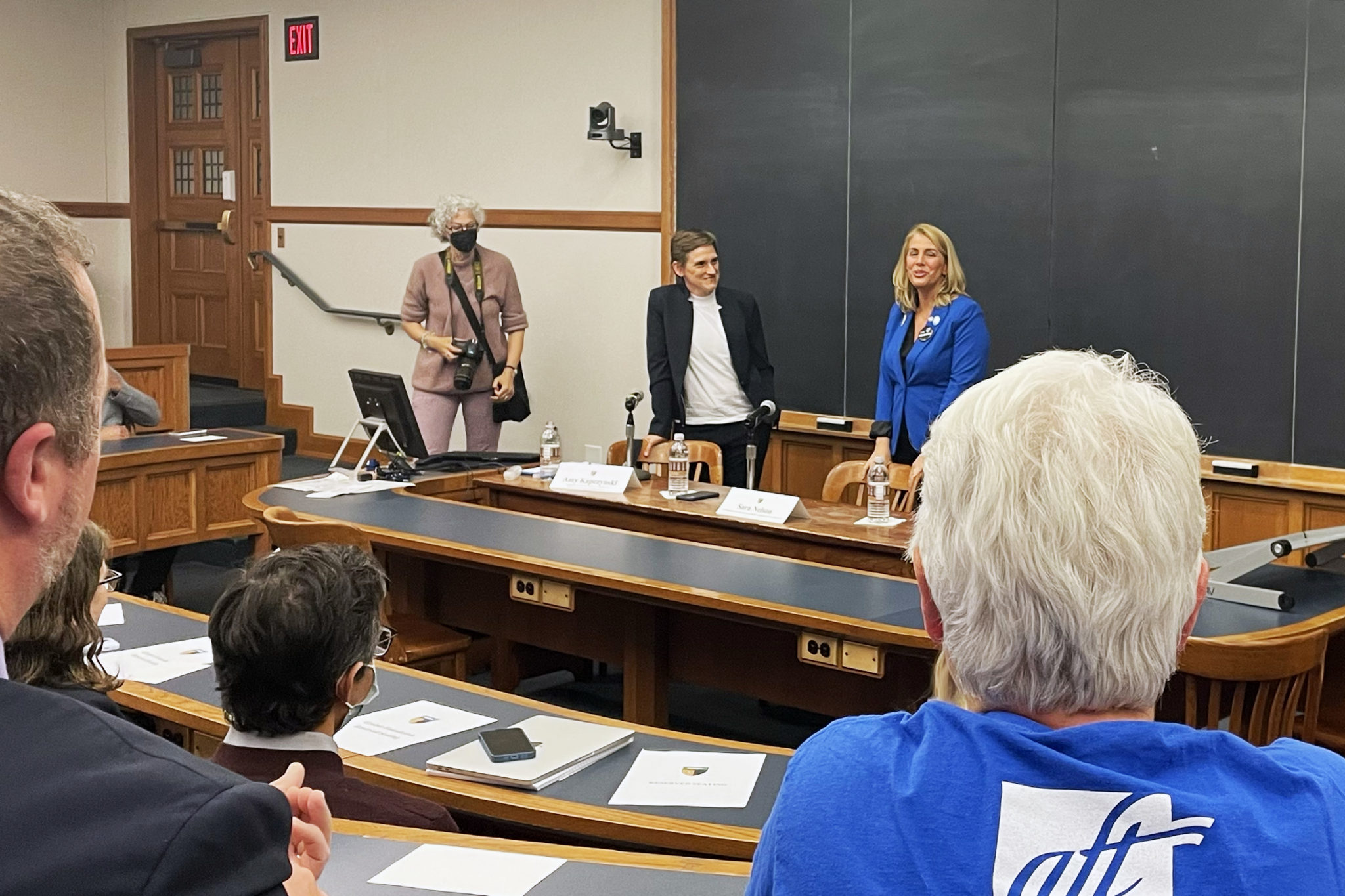Flight attendant union leader Sara Nelson gives annual Gruber Lecture in Women’s Rights at Yale Law School
On Oct. 17, Sara Nelson gave the Fall 2022 Gruber Distinguished Lecture in Women’s Rights, sponsored by the Gruber Program for Global Justice and Women’s Rights, at the Yale Law School.

Benjamin Hernandez, Contributing Photographer
This year’s Gruber Lecturer in Women’s Rights used her time to advocate for the nation’s workers standing together in solidarity.
Flight attendant union leader Sara Nelson gave the Gruber Distinguished Lecture in Women’s Rights on Oct. 17. Along with The Gruber Distinguished Lecture in Global Justice, the lecture is one of two signature annual lectures at the Yale Law School that are open to both the entire Yale community and invited guests.
The Gruber lectures are talks that feature speakers whose achievements have helped serve the causes of global justice and women’s rights, according to a YLS newsletter. Nelson has served as the International President of the Association of Flight Attendants-CWA, AFL-CIO — a flight attendant union in the U.S. representing nearly 50,000 flight attendants at 17 airlines — since 2014.
“Many have taken notes of Sara’s extraordinary ability to rally support for the seemingly impossible,” YLS Dean Heather Gerken said when introducing Nelson. “She stands alongside labor movement giants and yet she manages to stand in a lane that is entirely her own — although Sara works around the clock in her position as union leader and labor organizer, she has maintained her certification as a flight attendant… [which] gives us a window into how she manages to stay so close to the struggles of workers on the ground.”
Nelson’s talk, which was on “Women and Unions: Solidarity is a Force Stronger than Gravity,” emphasized the strength that comes with numbers.
“The labor movement is for everyone,” Nelson said during the talk. “We have to organize in the tens of millions [and] this is the only way that we are going to save democracy and make democracy fulfill its promise in this country.”
Nelson recalled reciting the United States Pledge of Allegiance when she was still in school. She fixated on the ending phrase “indivisible, with liberty and justice for all” as a “solemn vow that we were making to each other.”
Teaching people to prioritize the working class in social and political agendas is key to tackling the obstacles threatening democracy in the U.S., she said.
“Unchecked capitalism has run amok and is putting us on a march to fascism,” Nelson said. “And if we don’t give people power and give people the ability to organize, especially women… and organize around the social issues, [the] economic issues are never going to be fixed and we will lose any hope of reclaiming our democracy that’s on life support now.
YLS professor Amy Kapczynski LAW ’03 helped guide the discussion, asking Nelson questions about the state of the labor movement, labor issues in general, and the people they have most affected which have helped mold the history of labor unions.
Kapczynski described the talk as a “very rare chance to hear from perhaps the most dynamic labor leader in the country” and said that she hopes that the audience better grasped the power of labor organizing.
“As someone who believes that the misery of work for so many Americans is an enormous failure of our democracy, I also hope that she helped convince people that organizing workers is important – and can do more than they realized to address some of the deep problems in our democracy – not just exploitation and inequality in the workplace, but also climate change, reproductive rights, voting rights, and more,” Kapczynski wrote in an email to the News.
Mitchell Harpenau ’23 said he had heard of Nelson’s work before the event and that he chose to skip class to attend.
Harpenau said that he admires Nelson for her strike strategy and for continuing to advocate for workers.
“It was actually very interesting to hear her speak,” Harpenau said. “I think it’s very inspiring to see someone at the upper echelons of union power still advocating for such belligerent and direct action strategies… with such political justification as well.”
Nelson emphasized the importance of inclusivity to U.S. labor movements to ensure that their efforts bear effective results.
Referencing the media’s tendency to focus on her appearance as a woman, she said that her “scarves, pearls, and perfectly coiffed hair” have allowed her entrance to rooms that the labor conversation has not previously existed in.
“Having a diverse labor leadership will also give us entrance into that conversation and help us wipe away the stereotypes that allow labor to be dismissed or thought of in only one way and make it start to look like the main event,” Nelson said. “We have to redefine ourselves and we have to have the country understand that this is for everyone, otherwise it doesn’t work.”
Nelson ended her discussion by asking guests to join her in singing Solidarity Forever, a hymn that remained the anthem of the labor movement through the middle of the twentieth century.
The Gruber Program for Global Justice and Women’s Rights was established at Yale Law School in 2o11 by philanthropists Peter and Patricia Gruber as part of the Gruber Foundation.







